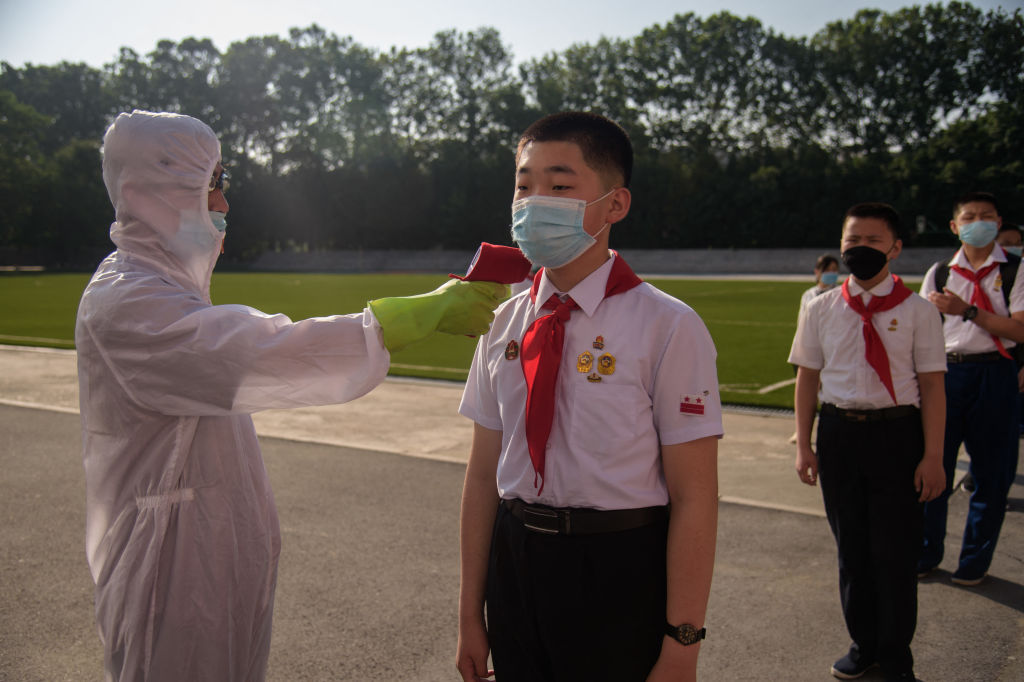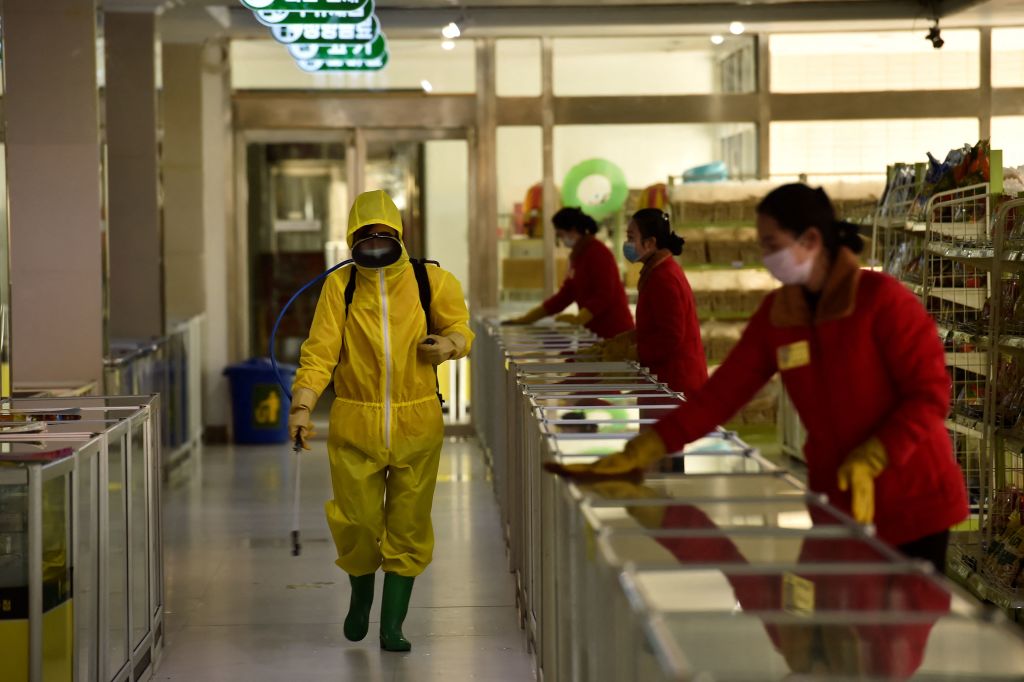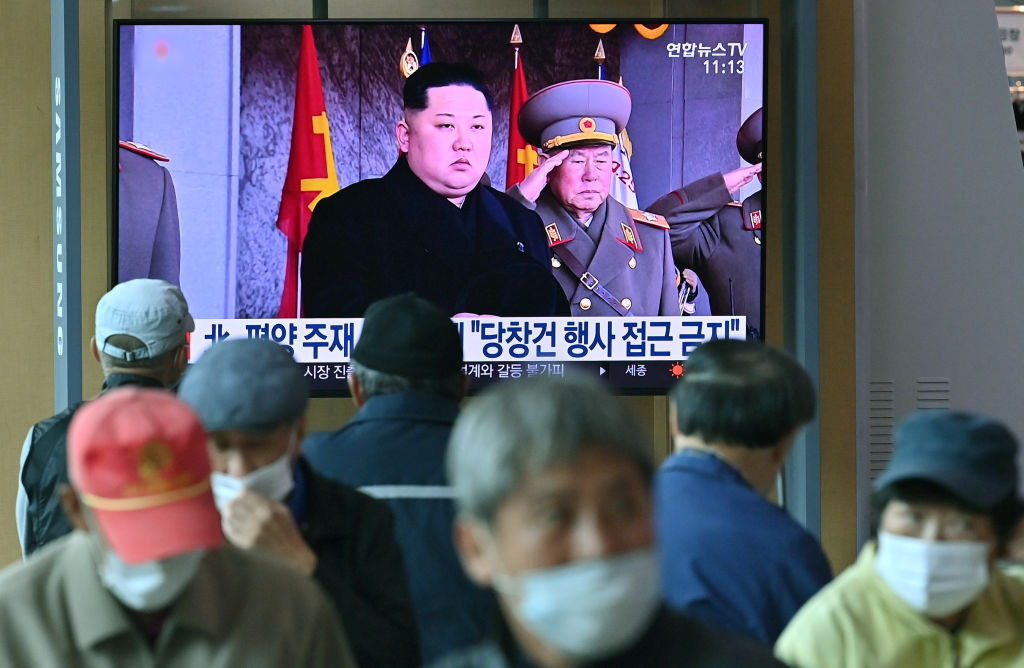
North Korea’s leader Kim Jong Un is pulling out all the stops to combat a massive COVID-19 outbreak that could force the reclusive state to open up to external assistance.
After Pyongyang went public about the outbreak on May 12—the first time during the pandemic that North Korea admitted to coronavirus within its borders—Kim began attending emergency meetings almost every day. He ordered a nationwide lockdown, deployed military personnel to deliver medicine, and publicly lambasted officials for failing to keep drug stocks available and pharmacies open.
None of this is standard behavior for Kim, whose propaganda machinery goes to great lengths to portray “Dear Leader” as a steady hand on the tiller. But he has reasons to be nervous. Since confirmation of the first COVID-19 case just last week, nearly two million people have succumbed to what the state-run Korean Central News Agency refers to as “fever.” On Thursday alone, the country reported 262,270 new cases. A “high incidence” of the fever has been reported in the capital, where it has claimed 62 lives.
Experts tell TIME that because of its low testing capacity, the impoverished state of 25 million will be hard pressed to confirm if all these cases are COVID-19 and thus be unable to ascertain the true spread of the virus. With poor health infrastructure and lack of vaccines exacerbating the health crisis, North Korea may see a ballooning of casualties—unless it asks for help.
Would Kim ever do that? Central to his governance is his grandfather Kim Jong Il’s juche, a political philosophy of self-reliance and fierce independence. Pyongyang rebuffed previous offers by humanitarian groups and other countries to send vaccines and instead insisted on border closures to ward off infections.
Although COVID-19 figures from the country are unreliable, North Korea’s admission of such high numbers may be taken as a sign of a policy rethink and being receptive to help, says Lim Sojin, associate professor of North Korea studies at the U.K.’s University of Central Lancashire. She says the admission will allow Pyongyang to rebook its initial quota of doses from the WHO-led COVAX vaccine sharing program, which cut the allotted jabs for North Korea to 1.54 million from 8.11 million last year after the country failed to arrange for any shipments. “It’s a really nice way to save their face,” Lim says.

North Korea’s potentially ‘destabilizing’ COVID outbreak
Economic problems such as food shortages have long plagued North Korea, with the state choosing to spend a significant chunk of its GDP on large-scale military and nuclear programs instead of civilian resources. The pandemic has worsened the economy even further; South Korea’s central bank estimated a 23-year record contraction in 2020. Kim has promised to solve the “food, clothing and housing problem for the people” but has instead focused on missile launches—inviting more sanctions on the nuclear state.
Chronic food shortages have led to undernourishment: more than 4 in 10 people do not get their daily nutritional needs met. A 2019 U.N. report said that almost 10 million people in North Korea do not have access to safe drinking water and 16% of the population have no access to basic sanitation facilities, putting them at risk of severe disease.
In a report submitted to the U.N. in 2021, North Korea itself reported a “lack of capacity of health personnel, low technical foundation of pharmaceutical and medical appliance plants and shortage of essential medicines.” Pharmacies also reportedly lack medical supplies and storage facilities. Hospitals also suffer from poor electricity supply and lack of heating.
Given these, a massive outbreak in North Korea would be “dangerous” and “potentially destabilizing,” according to J. Stephen Morrison, director of the Global Health Policy Center at the Center for Strategic and International Studies in Washington. He predicts high fatalities, with a mortality rate as high as 1%, and possibly half-a-million to a million cases of severe illness.
The median age of North Koreans is around 35, which may somewhat mitigate the risk of death. But the country “has a very fragmented and weak health infrastructure which will be easily overwhelmed and they do not have medical stockpiles that are of any use in this situation,” Morrison says.
Kim has so far deflected the failure to contain the outbreak on local health officials, and is now relying on his military to battle the epidemic.
Residents had earlier been advised to take painkillers and antibiotics rather than antivirals. State media also endorsed traditional medicine such as burdock root and japonica tea. But with the COVID-19 situation rapidly changing, North Korea is faced with two options: allow Omicron to run rampant and face the consequences, or open up to aid.
“It’s very late in the day—there are no good options,” Morrison says. “It’s too late to prevent a very bad outbreak. But if you reopened rapidly, you could begin to lower the suffering levels and begin to build back for the future.”

The foreign aid dilemma
It appears that outside help is being allowed to come in. Pyongyang flew three Air Koryo planes into the Chinese city of Shenyang on May 16 that flew back with medical supplies later in the day, according to a South Korean state news agency report citing unnamed sources. Kim has praised China’s handling of the epidemic, even though the giant neighbor is also currently struggling to contain outbreaks.
Baek Jieun, a research fellow with the Korea Project at Belfer Center at Harvard Kennedy School, says these signal the situation inside the state is “dire” enough for a policy change.
Kim “really went on this message for the past two years that they can do all this by themselves,” Baek tells TIME. “The fact that they very explicitly went to another country—albeit it’s China, a friendly country—undercuts his message that they’re going to solve the COVID-19 problem by themselves, which is actually kind of a hit to his legitimacy.”
South Korea has also offered to send vaccines, medical personnel, and equipment, but says it has not heard back from the North. The U.S. has said it won’t deliver vaccines to North Korea directly, but is fully supportive of the global COVAX initiative.
Should the U.S. decide to offer help, Baek says he hopes Kim would accept it, even though he isn’t likely to. “I hope Kim Jong Un does not reject the donation, because the citizens of North Korea would really benefit.”
According to Lim at the University of Central Lancashire, North Korea is not used to the paperwork and accountability mechanisms of the West and humanitarian groups giving donations. But this shouldn’t deter countries from offering aid, she says.
How the help is offered matters just as much. Lim says foreign statements and sanctions related to North Korea’s nuclearization at a time of COVID-19 turmoil may cause Pyongyang to question the aid given to them.
“We really need more engagement and take a more customized approach to North Korea rather than denuclearization-first-and-lifting-sanctions-after,” she says. “This kind of rhetoric does not work anymore.”
More Must-Reads from TIME
- Cybersecurity Experts Are Sounding the Alarm on DOGE
- Meet the 2025 Women of the Year
- The Harsh Truth About Disability Inclusion
- Why Do More Young Adults Have Cancer?
- Colman Domingo Leads With Radical Love
- How to Get Better at Doing Things Alone
- Michelle Zauner Stares Down the Darkness
Contact us at letters@time.com